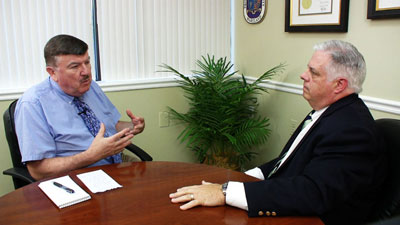This column appears in the December issue of The Business Monthly newspaper serving Howard and Anne Arundel counties.
The convincing victory of Donald Trump and a Republican Congress sent millions of Democrats into a deep funk. What was bad news for many voters compounded what was already lingering bad news for Maryland’s budget that faces big deficits.
The incoming Trump administration is not likely to provide much help. Its policies may even make a bad state fiscal situation worse.
Many individual Marylanders might benefit from Trump income tax policies, such as keeping the current Trump income tax scheme that is about to expire and removing all taxes on Social Security benefits and on tips. But it’s hard to come up with a Trump campaign proposal that would not actually hurt the state budget.
Cutting the federal workforce could whack Maryland hard. Over 160,000 Marylanders work for the federal government, not counting the secret workers at the National Security Agency, estimated at 20,000-30,000. Some 8% of Maryland taxpayers work for the feds.
Another chunk are federal contractors, with $42 billion in contracts flowing into Maryland, mostly for the defense department.
Will Trump make other cuts to $19 billion in aid the state gets directly from the feds for Medicaid, welfare and other programs?
Key bridge, FBI HQ, transit?
In addition to these potential cuts, will Congress actually fund the total $4 billion to replace the Francis Scott Key Bridge as President Biden promised? Will sharp tariffs on imports such as foreign cars hurt the Port of Baltimore, the largest U.S. arrival port for foreign cars and trucks?
Will the new F.B.I. headquarters actually get built in Greenbelt? Trump wanted it built in downtown D.C. in his first term. Now, he probably wants it built in hell.
What about mass transit? Will a Trump transportation department help fund a new Red Line in Baltimore or the mounting deficits at Washington’s Metro system that serves the Maryland suburbs?
That’s just speculation about what might happen under a retaliatory president whom Maryland voters overwhelmingly rejected in three elections, not to mention all its anti-Trump Democratic leaders.
What’s not speculation is the already bad fiscal situation Maryland faces.
Maryland’s budget forecast in the coming two to five years is “worse than the Great Recession” of 2008, David Romans, the legislature’s top fiscal analysts, told lawmakers Nov. 12. Not only is there “an enormous gap” between state spending and revenues, but the state’s economy is “growing very, very slowly.” State revenues are rising only about 3% a year while planned spending is rising by 6% a year. It’s simple arithmetic. Expenses are rising twice as fast as income.
Stagnant economy, higher spending
“It’s not being driven by a recession,” as it was after 2008, Romans said. “It’s being driven by a stagnant economy and by our spending ambitions.”
Bottom line: In fiscal 2026, which starts next July, Maryland faces a $2.7 billion shortfall. The state can pretty much manage that by taking money from the rainy-day fund, which is pretty flush from federal Covid pandemic funds, and paying for some projects with bonds. In household terms, that means taking money out of savings and putting some routine expenses on a credit card.
The next year, fiscal 2027, there’s another $2.7 billion shortfall, and the state will have done all the easy stuff to make that up. The following year, the deficit grows to $4.7 billion, then to $5.2 billion and so on.
This is called a structural deficit, because it’s built into future budgets — estimated revenues minus planned spending.
By 2030, Maryland will have “only enough revenue to cover 84%” of its expenses, “the largest gap in the last 20 years,” Romans said, adding yet another alarming figure.
Higher taxes, spending cuts?
This predictable scenario is what led leaders in the House of Delegates last year to propose tax hikes to fill in revenues. Senate leaders and Gov. Wes Moore said no, let’s wait. With the problem getting closer, House Democratic leaders will be pushing for tax hikes again. Republicans will be pushing for spending cuts, particularly in the biggest growing programs – Medicaid and the Blueprint school funding.
As Romans points out, you can get by another year with rainy day money and shifting money around. But because he is a nonpartisan fiscal analyst, he doesn’t point out the obvious political problem in the timing. 2026 is an election year.
The unwritten political rule is that governors and lawmakers do not pass tax hikes and unpopular spending cuts in an election year. Their other constraint is more than a rule; it’s the law. The Maryland Constitution requires that the budget be balanced every year. That’s unlike the federal government which runs huge deficits every year, by printing money and selling bonds.
What about using more state bonds to pay for programs? Maryland has for decades touted its triple-A bond rating, which gets it very favorable interest rates on its bonds. But another chart of the Nov. 12 fiscal briefing is headlined: “By Any Measure, Maryland is a High Debt State.” It shows Maryland has some of the highest debt ratios of all the 14 triple-A states. However, it also notes that one of three bond-rating agencies, “Moody’s Investors Service revised Maryland’s outlook to negative. Reasons cited were expected structural deficits and plans to reduce the general fund reserves.”
What about growing that stagnant economy to painlessly produce more revenue? Wes Moore would love to do that; Republican Larry Hogan said he did but figures show he mostly didn’t. Are higher taxes on high-income residents and corporations a good way to grow the economy?
According to the Tax Foundation, Maryland ranks 46th in Overall Business Tax Climate. The foundation doesn’t like taxes and has consistently ranked Maryland a high tax state for many years. All of Maryland’s neighbors, except for the District of Columbia, rank much better for business tax climate and have higher growth rates.
There are no easy choices to balance Maryland’s budget in coming years. The November election didn’t make it easier and may make it worse.






Maryland’s budget has faced significant challenges in recent years, with rising costs and economic pressures impacting funding for essential services. Politicians in the state have often focused on partisan divides, which can hinder collaborative efforts to address these financial issues effectively. One need only to consider the vitriolic rhetoric of Congressman Jamie Raskin for one.
However, a more constructive approach could yield positive results. By fostering dialogue and cooperation, Maryland’s leaders could better align their budgetary priorities with the needs of their constituents. This collaborative spirit could pave the way for innovative solutions that ensure financial stability while also investing in vital programs for education, healthcare, and infrastructure. Stop announcing in advance what you are not going to do and start thinking about what you can do.
President Elect Donald Trump has from time to time expressed his willingness to assist states facing budgetary constraints, provided that local leaders are open to collaboration. If Maryland politicians were less negative and more receptive to bipartisan efforts, they might find opportunities for federal support that could alleviate some of the fiscal burdens they currently face. Embracing a cooperative mindset could lead to initiatives that not only stabilize the state’s economy but also strengthen relationships with federal representatives, ultimately benefiting Marylanders through improved services and investments.
Think about it, as has been said in the past – “What have you got to lose?”
Its simple. You spend more money than you have, you end up in a hole. Become dependent on government, and someday, you will have to go through withdrawal.